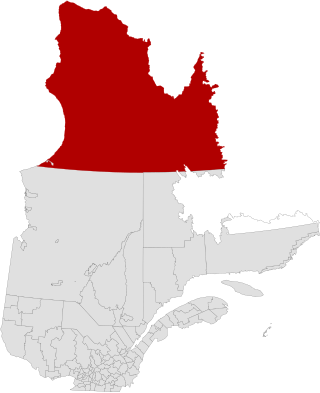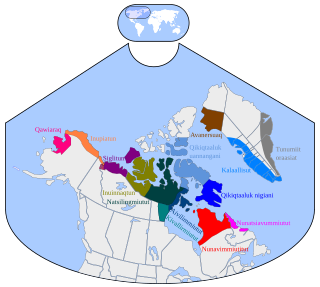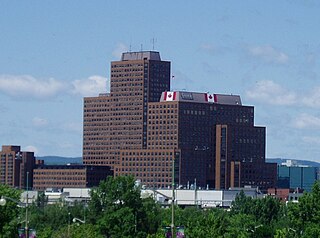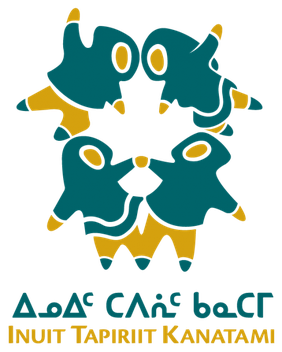Related Research Articles

Inuit throat singing, or katajjaq, is a distinct type of throat singing uniquely found among the Inuit. It is a form of musical performance, traditionally consisting of two women who sing duets in a close face-to-face formation with no instrumental accompaniment, in an entertaining contest to see who can outlast the other; however, one of the genre's most famous practitioners, Tanya Tagaq, performs as a solo artist. Several groups, including Tudjaat, The Jerry Cans, Quantum Tangle and Silla + Rise, also now blend traditional throat singing with mainstream musical genres such as pop, folk, rock and dance music.

Nunavik is an area in Canada which comprises the northern third of the province of Quebec, part of the Nord-du-Québec region and nearly coterminous with Kativik. Covering a land area of 443,684.71 km2 (171,307.62 sq mi) north of the 55th parallel, it is the homeland of the Inuit of Quebec and part of the wider Inuit Nunangat. Almost all of the 14,045 inhabitants of the region, of whom 90% are Inuit, live in fourteen northern villages on the coast of Nunavik and in the Cree reserved land (TC) of Whapmagoostui, near the northern village of Kuujjuarapik.

Kangiqsualujjuaq is an Inuit village located at the mouth of the George River on the east coast of Ungava Bay in Nunavik, Quebec, Canada. Its population was 956 as of the 2021 census.

Inuktitut, also known as Eastern Canadian Inuktitut, is one of the principal Inuit languages of Canada. It is spoken in all areas north of the North American tree line, including parts of the provinces of Newfoundland and Labrador, Quebec, to some extent in northeastern Manitoba as well as the Northwest Territories and Nunavut. It is one of the aboriginal languages written with Canadian Aboriginal syllabics.
Indigenous peoples in Quebec total eleven distinct ethnic groups. The one Inuit community and ten First Nations communities number 141,915 people and account for approximately two per cent of the population of Quebec, Canada.

Crown–Indigenous Relations and Northern Affairs Canada is the department of the Government of Canada responsible for Canada's northern lands and territories, and one of two departments with responsibility for policies relating to Indigenous peoples in Canada.
Charlie Watt is a former Canadian Senator from Nunavik, Quebec.

Inuit Tapiriit Kanatami, previously known as the Inuit Tapirisat of Canada, is a nonprofit organization in Canada that represents over 65,000 Inuit across Inuit Nunangat and the rest of Canada. Their mission is to "serve as a national voice protecting and advancing the rights and interests of Inuit in Canada."
The James Bay and Northern Quebec Agreement is an Aboriginal land claim settlement, approved in 1975 by the Cree and Inuit of northern Quebec, and later slightly modified in 1978 by the Northeastern Quebec Agreement, through which Quebec's Naskapi First Nation joined the agreement. The agreement covers economic development and property issues in northern Quebec, as well as establishing a number of cultural, social and governmental institutions for Indigenous people who are members of the communities involved in the agreement.
Makivvik is the legal representative of Quebec's Inuit, established in 1978 under the terms of the James Bay and Northern Quebec Agreement, the agreement that established the institutions of Nunavik. As such, it is the heir of the Northern Quebec Inuit Association, which signed the agreement with the governments of Quebec and of Canada.

Torngat Mountains National Park is a Canadian national park located on the Quebec-Labrador Peninsula in the province of Newfoundland and Labrador. The park encompasses 9,700 km2 of mountainous terrain between Northern Quebec and the Labrador Sea. It is the largest national park in Atlantic Canada and the southernmost national park in the Arctic Cordillera. It partially contains the Torngat Mountains, the highest mountains in mainland Canada east of the Rocky Mountains.

Akulivik is an Inuit village in Nunavik, in northern Quebec, Canada. It is located on a peninsula that juts southwesterly into Hudson Bay across from Smith Island, Nunavut (Qikirtajuaq). Akulivik lies 1,850 km north of Montreal.
Taamusi Qumaq, was an Inuit historian, linguist, writer, politician and elder from Nunavik, Quebec, Canada, who contributed to the preservation of the Inuit language and traditional culture. Despite lacking any formal schooling, Qumaq published two seminal works on the Inuit culture: a 30,000-word comprehensive Inuktitut dictionary and an encyclopedia on Inuit traditional customs and knowledge. He was fluent in Inuktitut only.
Tivi Etok is an Inuit artist, illustrator, and printmaker. In 1975, he was the first Inuk printmaker to have a collection of his own prints released. He is now an Elder.

The Inuvialuit Settlement Region, abbreviated as ISR, located in Canada's western Arctic, was designated in 1984 in the Inuvialuit Final Agreement by the Government of Canada for the Inuvialuit people. It spans 90,650 km2 (35,000 sq mi) of land, mostly above the tree line, and includes several subregions: the Beaufort Sea, the Mackenzie River delta, the northern portion of Yukon, and the northwest portion of the Northwest Territories. The ISR includes both Crown Lands and Inuvialuit Private Lands. Most of the ISR is represented by Nunakput, the territorial electoral district, meaning "our land" in Inuvialuktun.
The Arctic policy of Canada includes both the foreign policy of Canada in regard to the Arctic region and Canada's domestic policy towards its Arctic territories. This includes the devolution of powers to the territories. Canada's Arctic policy includes the plans and provisions of these regional governments. It encompasses the exercise of sovereignty, social and economic development, the protection of the environment, and the improving and devolving of governance.
Bernard Saladin d'Anglure is a Canadian anthropologist and ethnographer. His work has primarily concerned itself with the Inuit of Northern Canada, especially practices of shamanism and conceptions of gender. As an anthropological theorist, he studied under the structuralist Claude Lévi-Strauss, but has become most recognized for his innovative methodology and elaboration of the concept of the "third sex". He speaks French, English and Inuktitut fluently. He is currently Professor Emeritus (Retired) at the Université Laval.
John Amagoalik is an Inuit politician from Nunavik (Québec). He campaigned for Inuit rights and made a significant contribution to the founding of the Canadian territory of Nunavut. He was Chairman of the Nunavut Implementation Commission and is widely regarded as the "Father of Nunavut".
Johnny May is a Canadian Inuk bush pilot living in Kuujjuaq, known as being the first Inuk pilot in eastern Canada. He is credited with saving the lives of many Inuit in search-and-rescue missions and operating medevac airplane services to transport sick Inuit to health centres. May is the older brother of Canadian Governor General, Mary Simon.
Zebedee Nungak is a Canadian Inuit author, actor, essayist, journalist, and politician. As a child, Nungak was taken from his home in the community of Saputiligait, along with two other children, for the purposes of an experiment by the Canadian government to "[expunge] them of Inuit culture and groom them to become northern leaders with a southern way of thinking." Nungak later became pivotal in securing successful land rights claims and the creation of his home territory of Nunavik.
References
- 1 2 3 George, Jane (April 15, 2005). "Savoie to lead new Inuit secretariat". nunatsiaq.com. Archived from the original on May 12, 2008. Retrieved 2009-01-13.
- 1 2 3 4 George, Jane (April 7, 2006). "Inuit Relations Secretariat loses interim director Donat Savoie retires after 36 years with DIAND". Archived from the original on May 13, 2008. Retrieved 2009-01-13.
- 1 2 3 "Savoie, Donat". cbs.dk. February 1, 2008. Retrieved 2009-01-13.[ permanent dead link ]
- ↑ "The World of Tivi Etok". sikunews.com. Archived from the original on 2011-07-16. Retrieved 2009-01-13.
- ↑ "Weaver-Tremblay Award". anthropologica.ca. December 11, 2008. Archived from the original on September 25, 2008. Retrieved 2009-01-13.